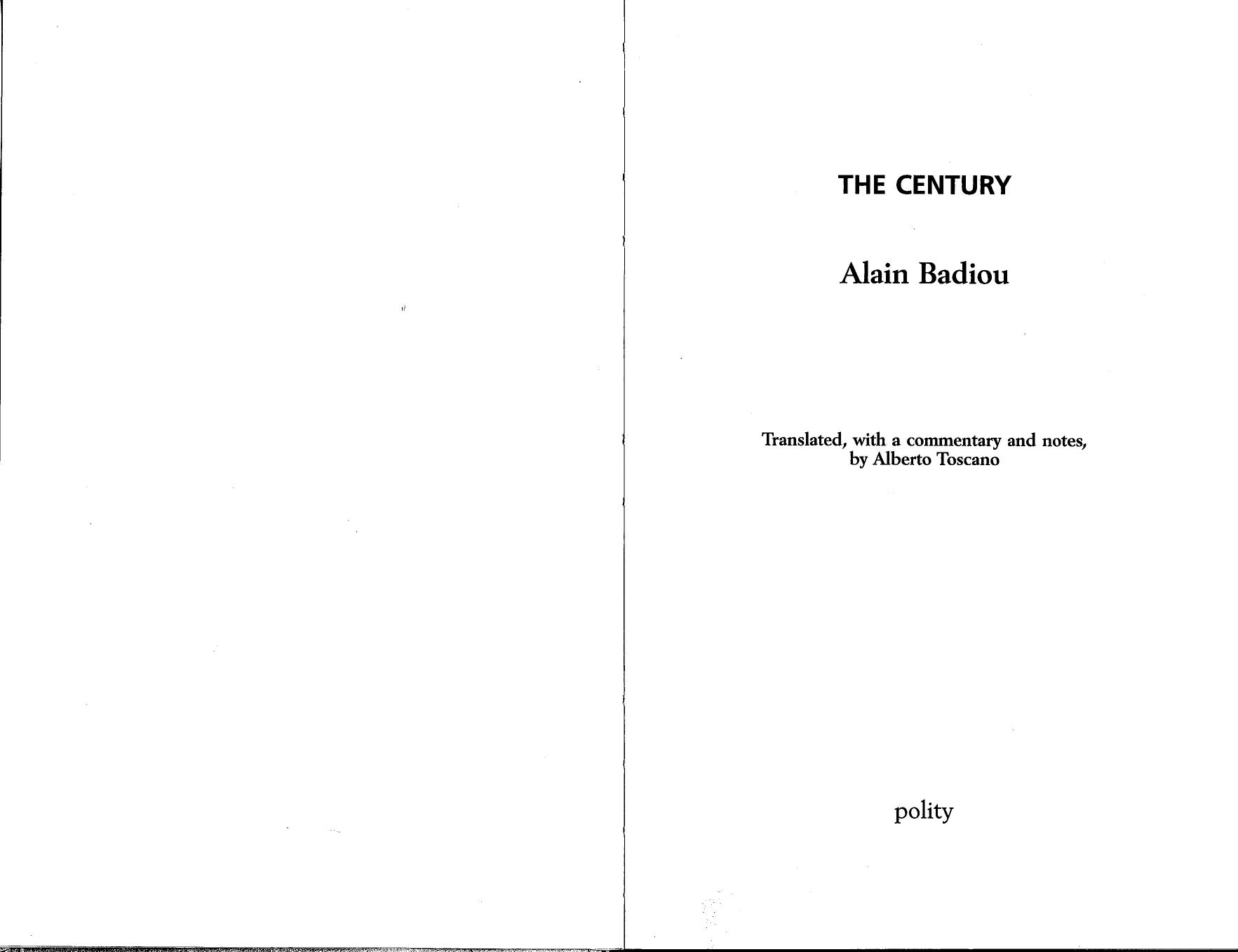The Century by Alain Badiou

Author:Alain Badiou
Language: eng
Format: epub, pdf
Publisher: Wiley
Published: 2018-02-08T16:00:00+00:00
Fourth variation: temporal
The century put forward its own vision of historical time. It had a very ample genealogical vision of political confrontations, thereby following Marx when he wrote that the entire history of mankind was that of class struggle. Academic historians, for their part, worked on long durations, holding the scale of a human life to be a trifling quantity when compared to the flux of significations.37 Plainly, there was nothing ‘humanist’ about this history.
It is very striking to see that today we are practically bereft of any thinking of time. For just about everyone, the day after tomorrow is abstract and the day before yesterday incomprehensible. We have entered a period of a-temporality and instantaneity; this shows the extent to which, far from being a shared individual experience, time is a construction, and even, we might argue, a political construction. For example, let us briefly reconsider the ‘five-year plans’ that structured the industrial development of the Stalinist USSR. If the plan could be celebrated even in works of art, such as Eisenstein's film The General Line, it is because, over and above its (doubtful) economic significance, planning designates the resolve to submit growth to the political will of men. The five years of the five-year plan are much more than a numerical unit, they are a temporal material in which the collective will inscribes itself, day after day. This is indeed an allegory, in and by time, of the power of the ‘we’. In various ways, the entire century saw itself as a constructivist century, a vision which implies the staging of a voluntary construction of time.
There once existed the immemorial time of the peasantry, an immobile or cyclic time, a time of toil and sacrifice, barely compensated by the pattern of festivities. Today we endure the marriage of frenzy and total rest. On the one hand, propaganda declares that everything changes by the minute, that we have no time, that we must modernize at top speed, that we're going to ‘miss the boat’ (the boat of the Internet and the new economy, the boat of mobile phones for everyone, the boat of countless stockholders, the boat of stock-options, the boat of pension funds, I could go on…). On the other hand, all this hubbub cannot conceal a kind of passive immobility or indifference, the perpetuation of the status quo. This is a type of time upon which the will, whether collective or individual, has no grip: an inaccessible amalgam of agitation and sterility, the paradox of a stagnant feverishness.
Even if, as so often happens in the instant of invention, it was clumsily and dogmatically mishandled, the century's powerful idea of time must continue to inspire us – at the very least against the ‘modernizing’ temporality that annuls any subjectivation whatsoever. The idea is that if we wish to attain the real of time we must construct it, and that, when all is said and done, this construction depends entirely on the care with which we strive to become the agents of truth procedures.
Download
This site does not store any files on its server. We only index and link to content provided by other sites. Please contact the content providers to delete copyright contents if any and email us, we'll remove relevant links or contents immediately.
| Anthropology | Archaeology |
| Philosophy | Politics & Government |
| Social Sciences | Sociology |
| Women's Studies |
The remains of the day by Kazuo Ishiguro(8998)
Tools of Titans by Timothy Ferriss(8393)
Giovanni's Room by James Baldwin(7346)
The Black Swan by Nassim Nicholas Taleb(7128)
Inner Engineering: A Yogi's Guide to Joy by Sadhguru(6793)
The Way of Zen by Alan W. Watts(6614)
The Power of Now: A Guide to Spiritual Enlightenment by Eckhart Tolle(5781)
Asking the Right Questions: A Guide to Critical Thinking by M. Neil Browne & Stuart M. Keeley(5775)
The Six Wives Of Henry VIII (WOMEN IN HISTORY) by Fraser Antonia(5514)
Astrophysics for People in a Hurry by Neil DeGrasse Tyson(5189)
Housekeeping by Marilynne Robinson(4446)
12 Rules for Life by Jordan B. Peterson(4303)
Ikigai by Héctor García & Francesc Miralles(4274)
Double Down (Diary of a Wimpy Kid Book 11) by Jeff Kinney(4268)
The Ethical Slut by Janet W. Hardy(4251)
Skin in the Game by Nassim Nicholas Taleb(4248)
The Art of Happiness by The Dalai Lama(4130)
Skin in the Game: Hidden Asymmetries in Daily Life by Nassim Nicholas Taleb(4004)
Walking by Henry David Thoreau(3961)
